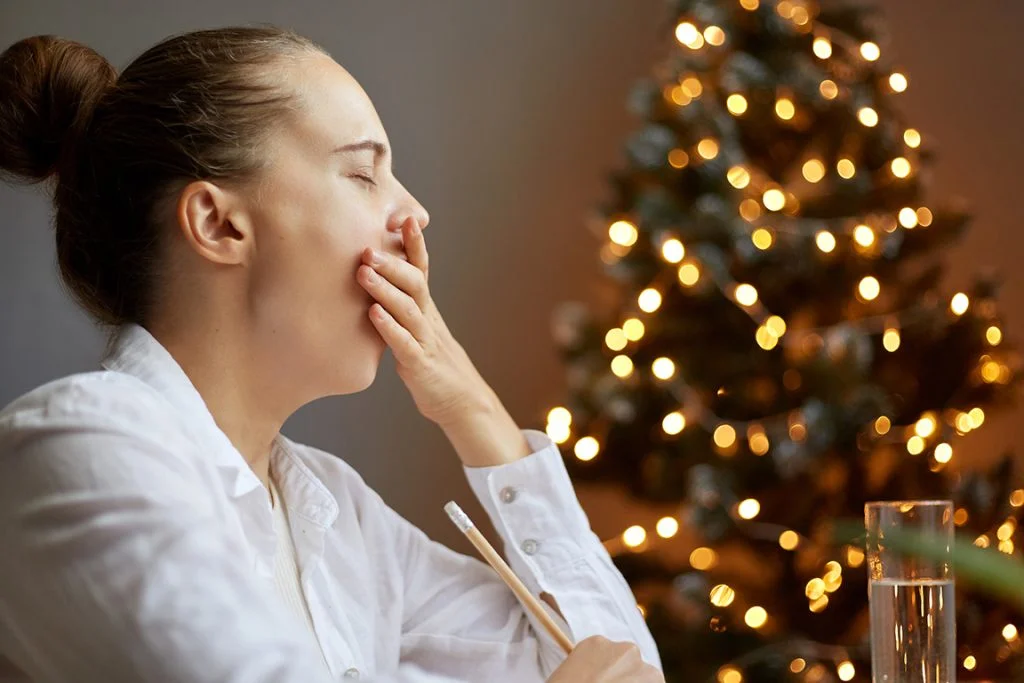
The holiday season can be a whirlwind, with gatherings, shopping, and gifting piled on top of all your usual responsibilities. It’s magical, sure, but making all that holiday magic means healthy habits can fall by the wayside, especially if you’re traveling or hosting guests this season. If you’re finding that eating a nutritious diet, managing stress and getting a good night’s sleep seem harder than usual during the holiday season, you’re not alone.
Of course, sacrificing sleep so you can socialize, get some last-minute online shopping done or wrap that mountain of presents can be problematic. Sleep is essential for a balanced mood, weight control and reduced stress, not to mention a strong immune system. So how do you balance a good night’s sleep with all the festivities? We spoke with a trio of sleep experts for their insights, including recommendations for getting good sleep during the holidays.
Long Story Short
- Sleeping in an unfamiliar environment can make it hard to fall asleep.
- For the best chances of restful sleep, try sticking to your usual routine, being mindful of healthy eating and drinking habits, finding outlets for stress, and bringing a few familiar sleep essentials from home.
- If you’re hosting, try to create a cool, comfortable place for your guests to sleep and remember to respect their privacy.
Tips for Sleeping Better at Someone Else’s House
“Sleeping over at someone else’s house, especially during the holidays, can be challenging due to the unfamiliar environment,” Dr. Shelby Harris, Sleepopolis’ director of sleep health, tells us. “Our brains naturally stay more alert in new places, and disrupted routines, strange sounds and smells, and missing comforts can further hinder sleep.” Fortunately, there are ways to get a decent night’s sleep at someone else’s house, including sticking to your bedtime routine as much as possible and managing your stress. Read on for more tips and information.
Stick To Your Routine
In many instances, consistency is key for achieving good sleep. When you follow your usual bedtime routine, even when you’re in a different environment, you send signals to yourself that it’s time to wind down for rest. “It helps regulate your internal clock, promoting relaxation and reducing stress,” says Harris. “This consistency improves sleep quality and leads to deeper, more restorative sleep.”
Remember Healthy Eating and Drinking Habits
Indulging in rich foods and sweets is pretty standard over the holiday season, but be mindful of how it can affect your sleep. That’s especially true in the evening, when alcohol, caffeine and heavy meals are much more likely to create sleep issues. “Alcohol disrupts sleep after initial sleepiness, caffeine delays sleep onset, and heavy meals cause indigestion and disrupt sleep,” explains Harris. She recommends opting for a light dinner for better sleep.
Clinical sleep educator Lauri Leadly points out that the holiday season is a celebratory time, and you may find yourself imbibing more than usual. She advises prioritizing hydration throughout the day and balancing alcoholic beverages with a full eight ounces of water. “It’ll help you drink less and will reduce intoxication, help prevent hangovers, force you to pace yourself, and it minimizes health risks,” she says.
Manage Your Stress
Stress is typically a byproduct of this busy time of year thanks to overexcited children, family drama, and all of those holiday get-togethers and wish lists. But stress makes it really hard to get the restorative sleep you need to enjoy the season or even just get through your day. Consider these small but impactful ways to manage your stress:
- Take a short walk. Even a 15-minute walk around the block can clear your mind and lighten your mood (1).
- Move through some gentle yoga poses. This form of meditative movement can be an incredible stress reliever, according to the National Center for Complementary and Integrative Health (NCCIH) (2). You don’t need a regular yoga practice to benefit, either. Just moving through some poses before bed can help relieve stress and improve sleep.
- Meditate. Research suggests that people who meditate tend to enjoy more mental clarity and emotional stability, and they may also sleep better, too. Meditation is associated with increased serotonin and melatonin levels, as well as reduced levels of norepinephrine, a neurotransmitter associated with anxiety (3) (4).
- Journal. Some people balk at journaling, but it can be an incredibly helpful tool for organizing feelings and letting emotions out in a healthy way. Even five minutes spent writing down your thoughts during lunch or before bedtime can be very cathartic (5). If using old school pen and paper is not for you, consider recording a voice memo on your phone. Complete permission to delete later, but even hearing yourself express your thoughts can help you release stress and get a better night’s sleep.
- Address conflict with openness and empathy. Tension can run high during the holidays, and it’s easy for feelings to get hurt. While it may be tempting to either avoid any issues, or lash out, it’s best to sit the person down and address things calmly and respectfully in order to move on. Resolving conflict can reduce stress on both sides and eliminate any nagging thoughts causing anxiety.
Practice Good Sleep Hygiene
Sleep hygiene describes the actions and lifestyle changes we embrace to promote healthy sleep, and again, bringing those positive sleep habits from home can make all the difference. Some of the other tips from our list here fall into sleep hygiene, including regular sleep and wake times and abstaining from alcohol and caffeine before bed. Other standard practices for good sleep hygiene include:
- Creating a dark, quiet, cool sleeping environment. That can be difficult when you’re traveling, so Leadley and Harris both recommend being proactive. Pack a sleep mask, earplugs or a travel white noise machine, and comfortable pajamas.
- Avoiding electronics that emit a blue light in the hours before bed. While exposure to blue light can be great during daytime hours, when you need to be alert and focused, research suggests it’s also associated with both difficulty falling asleep and poor sleep quality (6).
- Not forcing sleep. If you aren’t tired and you’re unable to sleep after being in bed for ten minutes or so, Harris recommends getting up and doing something calming until drowsiness sets in.
Bring A Piece Of Home On The Road
Familiar objects — like a pillow, blanket, or stuffed animal — can help us feel more safe and comfortable in unfamiliar environments, and Leadley and Harris both advise packing specific items from home for a better night’s sleep.
If you’re traveling light, a familiar fragrance, like a pillow spray, can also do the trick. “I like to travel with a pillowcase that I personally washed at home,” says Leadley. “It retains the scent I’m used to and feels good against my skin.”
Use A Sound Machine
Sleeping in a new place means new sounds, all of which can keep you up at night. But sound machines mask ambient noise, which can help you relax into sleep. Whether you find you prefer the gentle hiss of white noise, the deeper tone of brown noise, or the more nature-inspired sound of green noise, there are travel machines and apps that you can use to benefit from colored noise when you travel for the holidays.
Tips for Creating a Better Sleep Experience For Your Guests
You can help your guests sleep better by keeping their sleep space cool and quiet, ensuring they have privacy come bedtime, and offering different pillow choices. The TLDR here is to be the kind of host you’d appreciate if the roles were flipped. More tips and information below!
Keep the Sleep Space Cool and Quiet
Ideally, you can give your guests a private and comfortable place to sleep. That gives you the freedom to really make them feel welcome with small amenities, like a pitcher of water, a sleep mask, and a sound machine or earplugs. Of course, that’s not an option for everyone. While there’s only so much you can do if your guests are crashing on the sofa, being thoughtful about the reality of the living room is a great first step. For example, you may want to provide an oscillating fan to keep the room cool and help block ambient noise.
Offer Privacy For Your Guests Come Bedtime
Again, this is easy to do if you have a dedicated guest room. But if you’re putting up your guests in a guest room/office or in the living room, be mindful of bedtime and wake time and give them the privacy they deserve. “Ask about your guests’ sleep preferences and respect their schedule,” adds Harris.
Try To Have Climate-Appropriate Bedding
Maintaining a comfortable body temperature is important for good sleep, so assess the sheets and blankets on your guest bed or the pull-out sofa. Make sure your guests have warmer sheets and a heavier blanket if you’re in a colder part of the country.
Offer a Choice of Pillows
Different sleepers need different kinds of pillows to keep them comfortably supported all night, so it can be helpful to give your guests a choice of pillows. That way, your stomach-sleeping sister isn’t waking up with a sore neck from the high-loft pillow she wrestled with all night!
FAQs
Why can’t I sleep when I’m away from home?
It largely comes down to the unfamiliar environment. “Our brains naturally stay more alert in new places, and disrupted routines, strange sounds and smells, and missing comforts can further hinder sleep,” says Harris.
Is insomnia after travel normal?
Insomnia after travel is definitely normal, and you may know it by a different name: jet lag. “It occurs due to disrupted sleep-wake cycles and can last for a day per time zone crossed,” says Harris. She recommends adjusting your sleep schedule gradually, staying hydrated, getting sunlight, and creating a relaxing bedtime routine to help yourself get back on track.
The Last Word From Sleepopolis
The excitement and stress of the holiday season can absolutely affect your sleep, especially when you’re traveling. Do what you can to maintain a normal sleep schedule and be mindful of what you’re eating and drinking. You may also want to pack familiar sleep essentials to make you feel more comfortable in an unfamiliar place. Remember that it’s normal to feel a little more stressed than usual this time of year, so find an outlet to channel that negative energy away. Finally, if you’re hosting, think about what you would appreciate as a guest in someone else’s home. It takes a little intention, but you don’t have to wait for the new year to get the sleep you deserve.
Sources
Harris, Shelby. Personal interview. December 2024.
Leadley, Lauri. Personal interview. December 2024.
Motroni, Amy. Personal interview. December 2024.
- Laird E, Rasmussen CL, Kenny RA, Herring MP. Physical Activity Dose and Depression in a Cohort of Older Adults in The Irish Longitudinal Study on Ageing. JAMA Netw Open. 2024;6(7):e2322489. doi:10.1001/jamanetworkopen.2023.22489
- National Center for Complementary and Integrative Health. Yoga: What You Need to Know. August 2024.
- Thambyrajah JC, Dilanthi HW, Handunnetti SM, Dissanayake D. Serum melatonin and serotonin levels in long-term skilled meditators. Explore (NY). 2024;19(5):695-701. doi:10.1016/j.explore.2023.03.006
- Krishnakumar D, Hamblin MR, Lakshmanan S. Meditation and Yoga can Modulate Brain Mechanisms that affect Behavior and Anxiety-A Modern Scientific Perspective. Anc Sci. 2015;2(1):13-19. doi:10.14259/as.v2i1.171
- Smyth JM, Johnson JA, Auer BJ, Lehman E, Talamo G, Sciamanna CN. Online Positive Affect Journaling in the Improvement of Mental Distress and Well-Being in General Medical Patients With Elevated Anxiety Symptoms: A Preliminary Randomized Controlled Trial. JMIR Ment Health. 2018 Dec 10;5(4):e11290. doi: 10.2196/11290. PMID: 30530460; PMCID: PMC6305886.
- Silvani MI, Werder R, Perret C. The influence of blue light on sleep, performance and wellbeing in young adults: A systematic review. Front Physiol. 2022 Aug 16;13:943108. doi: 10.3389/fphys.2022.943108. PMID: 36051910; PMCID: PMC9424753.


























